#Clement of Alexandria
Text
First things

The worst way to read the Bible? Out of context.
Pick a random verse, maybe even just part of a verse. Then try to figure it out without any reference to the story or saying that it’s a part of. And don’t even think about the big picture of Jesus’ teachings or Scripture as a whole.
Reading the Bible that way is like taking someone who’s never seen corn on the cob, much less corn growing in a field. Handing them a single kernel of corn. And then asking them to describe the plant that it came from.
The odds of them getting anywhere close to actual corn (corn silk?) are about the same as winning the lottery.
It’s the same thing with Bible verses out of context. Only the odds are even worse.
In today’s Gospel, Peter gets whiny with Jesus. Again. “We have given up everything and followed you.”
Jesus doesn’t deny it. Instead, Jesus doubles down,
“There is no one among you who has given up house or brothers or sisters or father or mother or children or lands for my sake and for the sake of the Gospel who will not receive a hundred times more now in this present age,…and eternal life in the age to come.”
Does that mean that we’re supposed to give up everyone and everything? Is that the standard? Because if it is, my life does not measure up.
Writing around 200, Clement of Alexandria has the answer. And it starts with context, with how this passage fits into the rest of Jesus’ teachings,
“Do not let this passage trouble you. Put it side by side with the still harder saying Jesus delivered in another place in the words, ‘Whoever hates not his father, and mother, and children, and his own life besides, cannot be my disciple.’
Note that the God of peace, who exhorts us to love our enemies, does not arbitrarily require us to hate or abandon those dearest to us. But if we are to love our enemies, it must be in accordance with reason that, by analogy, we should also love our nearest relatives.
But insofar as one’s father, or son, or brother, becomes for you a hinderance to faith or an impediment to godly life, one should not collude with that temptation. Attend to the spiritual meaning.”
This is why I love the early Church writers. They struggled with the same things that you and I do, especially when it comes to how to live the Faith. As they saw it, the only way to do that was to first understand Scripture as a total package.
So what is the spiritual meaning?
It’s all about first things, about priorities. Because what you focus on, what you put first, determines everything else that follows.
If things are getting between you and God, you may not need to step away from them. But your relationship with them needs to change.
If those closest to you are getting between you and God, you may not need to step away from them. But your relationship with them needs to change.
Although they won’t lead you to God, God will lead you to a healthy relationship with them. If you let Him.
As C.S. Lewis puts it, “Aim at Heaven and you will get earth ‘thrown in,’ aim at earth and you will get neither.”
Today’s Readings
#First Things#Focus#God#Jesus#Catholic#Christian#Church#Priorities#Clement of Alexandria#C.S. Lewis#Context#Out of Context#Bible Verse#Relationship#Relationship with God#Moments before Mass
28 notes
·
View notes
Text

Featured image: A detail of the basalt Rosetta Stone (Photo at All-len-All)
A mystery surrounds the death of a 19th century-Frenchman who unraveled a great mystery—the ancient Egyptian hieroglyphs.
Jean-Francois Champollion died young after deciphering the Rosetta Stone, which unlocked the keys to the many enigmatic and beautiful hieroglyphic texts discovered in ruins, up and down the length of Egypt.
It gave modern people a much greater understanding of that great civilization.
Champollion was born on 23 December 1790 in France and died there on 4 March 1832, after visiting Egypt in 1829.
He had felt symptoms of malaise before departing for Egypt, according to a letter to the editor of the journal Clinical Neurophysiology by Dr. Hutan Ashrafian of the Department of Surgery and Cancer, Imperial College-London.
Jean-Francois Champollion is considered amongst the greatest linguists of all time; his decipherment of ancient Egyptian hieroglyphs and the Rosetta stone has led some to consider him the ‘‘Father of Egyptology.’’
His early death at the age of forty-one has typically been ascribed to fatigue and exhaustion from overwork on a year-long visit to Egypt.
This journey is reported as having initiated his progressive demise following the return to his native France, where he died from a reported stroke two years later.’ —H. Ashrafian
Dr. Ashrafian writes that the term “stroke” is used here in a generic sense rather than a formal medical diagnosis.
His family has refused to allow an autopsy but studying reports of Champollion’s condition has led the doctor to draw some conclusions about the death of the great scholar.

While in Egypt, Champollion did not suffer from lymph disease or fevers. But later in life, Champollion suffered from muscle weakness, limb paralysis, and ultimately, could not breathe.
He didn’t suffer from heart disease or lack of blood flow.
“Furthermore, at the moment of decipherment of hieroglyphs (1828), he is noted to have collapsed, though this may be viewed as a vasovagal [fainting] episode as a result of extreme emotional outpouring.
In his final weeks, he became emotionally labile consistent with progression of pseudobulbar dysfunction and eventually demonstrated a ‘locked-in’ syndrome before his death.”
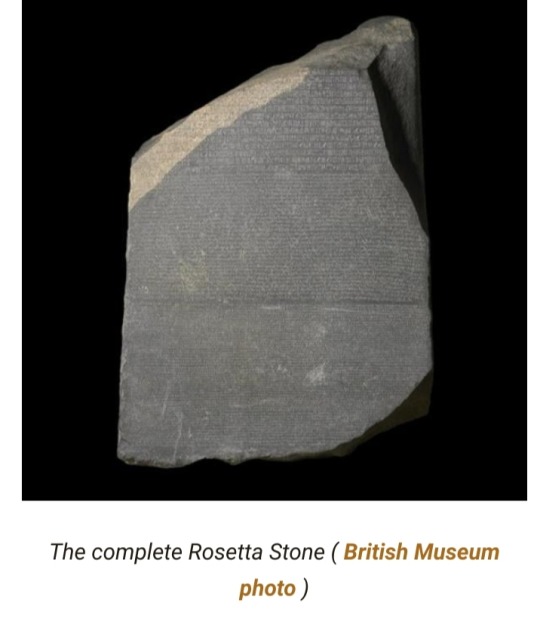
Pseudobulbar dysfunction means he was unable to speak.
It may be considered ironic that a man who gave a ‘voice’ to the people of ancient Egypt and opened their world to modern scholars like never before was unable to articulate his own thoughts just before he died.
Given that he was not mentally impaired, did not have seizures but first suffered from weakness in his legs, and later was unable to speak, led Dr. Ashrafian to conclude Champollion had amyotrophic lateral sclerosis—or total paralysis of his muscles.
Exhausted by his labors during and after his scientific expedition to Egypt, Champollion died of an apoplectic attack (stroke) in Paris on 4 March 1832 at the age of 41.
His body was buried in Père Lachaise Cemetery. On his tomb is a simple obelisk erected by his wife and a stone slab stating simply:
Ici repose Jean-François Champollion, né à Figeac dept. du Lot le 23 décembre 1790, décédé à Paris le 4 mars 1832
(Here rests Jean-François Champollion, born at Figeac, Department of the Lot, on 23 December 1790, died at Paris on 4 March 1832).
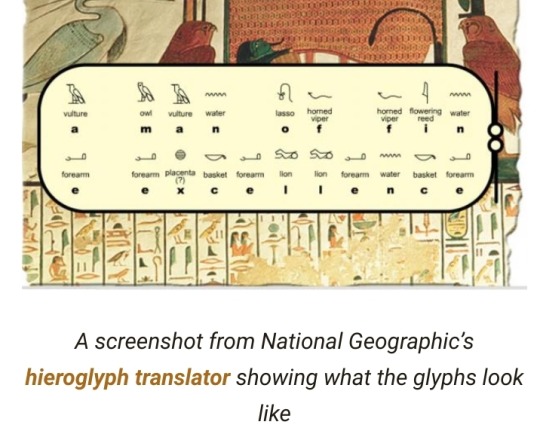
Words of the Gods
The word hieroglyph means “sacred words” or “sacred signs.”
Clement of Alexandria was the first to use the word. Ancient Egyptians called their script mdju netjer or “words of the gods.”
The first known hieroglyphs date to around 3400 to 3200 BC, the pre-dynastic era.
The last known hieroglyphs were carved in stone around 394 AD.
The Rosetta Stone, found by Frenchmen in 1799 in a fort at the town of Rosetta during Napoleon’s occupation of Egypt, has hieroglyphs, Egyptian demotic, and ancient Greek translations of the same text.
Champollion, who had taught himself ancient languages, was able to decipher its meaning and unlock the entire script.
A full translation of the Rosetta Stone can be viewed at the British Museum, which acquired the document and other artifacts after Napoleon’s defeat.
Here is an excerpt:
‘Whereas King Ptolemy, living forever, the Manifest God whose excellence is fine, son of King Ptolemy [and Queen] Arsinoe, the Father-loving Gods, is wont to do many favours for the temples of Egypt and for all those who are subject to his kingship, he being a god, the son of a god and a goddess;
and being like Horus, son of Isis and Osiris, who protects his father Osiris, and his heart being beneficent concerning the gods, since he has given much money and much grain to the temples of Egypt, [he having undertaken great expenses] in order to create peace in Egypt and to establish the temples, and having rewarded all the forces that are subject to his rulership;
and of the revenues and taxes that were in force in Egypt he had reduced some or(?) had renounced them completely, in order to cause the army and all the other people to be prosperous in his time as [king].’
Ancient Egyptians carved hieroglyphs into clay seals, rock, pottery vessels, and bone and ivory.
The Rosetta Stone scripts are carved in basalt.
#Jean-Francois Champollion#Rosetta Stone#Egyptian hieroglyphs#Père Lachaise Cemetery#hieroglyph#Clement of Alexandria#British Museum#Father of Egyptology#Ancient Egypt
40 notes
·
View notes
Text
And barbarians were inventors not only of philosophy, but almost of every art. The Egyptians were the first to introduce astrology among men. Similarly also the Chaldeans. The Egyptians first showed how to burn lamps, and divided the year into twelve months, prohibited intercourse with women in the temples, and enacted that no one should enter the temples from a woman without bathing. Again, they were the inventors of geometry. There are some who say that the Carians invented prognostication by the stars. The Phrygians were the first who attended to the flight of birds. And the Tuscans, neighbours of Italy, were adepts at the art of the Haruspex. The Isaurians and the Arabians invented augury, as the Telmesians divination by dreams. The Etruscans invented the trumpet, and the Phrygians the flute. For Olympus and Marsyas were Phrygians. And Cadmus, the inventor of letters among the Greeks, as Euphorus says, was a Phoenician; whence also Herodotus writes that they were called Phoenician letters. And they say that the Phoenicians and the Syrians first invented letters; and that Apis, an aboriginal inhabitant of Egypt, invented the healing art before Io came into Egypt. But afterwards they say that Asclepius improved the art. Atlas the Libyan was the first who built a ship and navigated the sea. Kelmis and Damnaneus, Idaean Dactyli, first discovered iron in Cyprus. Another Idaean discovered the tempering of brass; according to Hesiod, a Scythian. The Thracians first invented what is called a scimitar (arph), -- it is a curved sword, -- and were the first to use shields on horseback. Similarly also the Illyrians invented the shield (pelth). Besides, they say that the Tuscans invented the art of moulding clay; and that Itanus (he was a Samnite) first fashioned the oblong shield (qureos). Cadmus the Phoenician invented stonecutting, and discovered the gold mines on the Pangaean mountain. Further, another nation, the Cappadocians, first invented the instrument called the nabla, and the Assyrians in the same way the dichord. The Carthaginians were the first that constructed a triterme; and it was built by Bosporus, an aboriginal. Medea, the daughter of Æetas, a Colchian, first invented the dyeing of hair. Besides, the Noropes (they are a Paeonian race, and are now called the Norici) worked copper, and were the first that purified iron. Amycus the king of the Bebryci was the first inventor of boxing-gloves. In music, Olympus the Mysian practised the Lydian harmony; and the people called Troglodytes invented the sambuca, a musical instrument. It is said that the crooked pipe was invented by Satyrus the Phrygian; likewise also diatonic harmony by Hyagnis, a Phrygian too; and notes by Olympus, a Phrygian; as also the Phrygian harmony, and the half-Phrygian and the half-Lydian, by Marsyas, who belonged to the same region as those mentioned above. And the Doric was invented by Thamyris the Thracian. We have heard that the Persians were the first who fashioned the chariot, and bed, and footstool; and the Sidonians the first to construct a trireme. The Sicilians, close to Italy, were the first inventors of the phorminx, which is not much inferior to the lyre. And they invented castanets. In the time of Semiramis queen of the Assyrians, they relate that linen garments were invented. And Hellanicus says that Atossa queen of the Persians was the first who composed a letter. These things are reported by Seame of Mitylene, Theophrastus of Ephesus, Cydippus of Mantinea also Antiphanes, Aristodemus, and Aristotle and besides these, Philostephanus, and also Strato the Peripatetic, in his books Concerning Inventions. I have added a few details from them, in order to confirm the inventive and practically useful genius of the barbarians, by whom the Greeks profited in their studies. And if any one objects to the barbarous language, Anacharsis says, "All the Greeks speak Scythian to me."
Clement of Alexandria
21 notes
·
View notes
Text
Exodus 19, describing how Moses met God in a thick darkness or cloud, is a favourite symbol for conveying the experience of the incomprehensibility of the divine nature. The divine darkness signifies that God is essentially [unknown] to man. It also signifies the impossibility of describing God...
The limits of man’s rationality in relation to God is a fundamental aspect of the tradition. God cannot be named or described because all language is inadequate for expressing the divine... God’s negative, or apophatic, nature also implies that dogmas or doctrines are seen rather as ways of safeguarding the divine mystery than as definitive expressions of the contents of faith.
Clement of Alexandria and the Beginnings of Christian Apophaticism by Henny Fiska Hagg
#christian mysticism#clement of alexandria#via negativa#apophatic theology#darkness#the ineffable#new special interest just dropped!
14 notes
·
View notes
Text
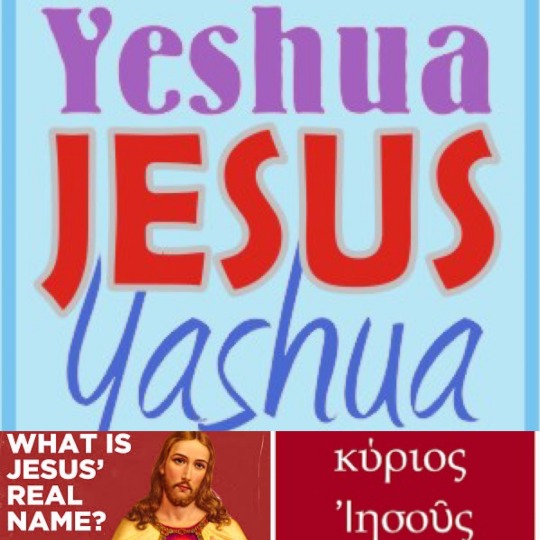
Answering Tuvia Pollack’s “Jesus, Yeshua or Yahshua?”
By Goodreads Author & Bible Researcher Eli Kittim 🎓
Introduction
Tuvia Pollack writes for Kehila News, which seems to be a Messianic-Jewish apologetics blog. He has no formal biblical training, as far as I know. According to the Kehila news blog, “Tuvia Pollack is an unpublished writer of historical fiction novels depicting Judeo-Christian relations throughout history.”
According to his own words, Mr. Pollack is “an Israeli Messianic Jew” who believes “in the Jewish faith … and the Old and New Testament.” He wrote an essay (“Jesus, Yeshua or Yahshua?”) in which he’s basically trying to establish the notion that the Greek name for Jesus (Ἰησοῦs) in the New Testament comes from the Hebrew Yeshua or Yahshua, and he therefore concludes that it doesn’t really matter what we call the messiah. In other words, we can call him any of the 3 names that he mentions above. However, his whole thesis is flawed because he doesn’t understand the finer points of biblical scholarship and how details often go unnoticed. I will not go over his entire paper but rather explore a few key comments that he made therein.
Does it Matter What We Call the Object of Our Worship?
In reference to Jesus, Mr. Pollack writes:
Calling on his name is what mattered,
whether you would say Iesous as the
Greeks would, or Yeshua as the Jews would.
Not true. The New Testament is very specific with names, especially with the name that is above all other names. If any form of the name of Yeshua would do, then that means that any form of the name of God would do as well, right? Wrong! Acts 4:12 (NJB) declares:
of all the names in the world given to
men, this is the only one by which we can
be saved.
Notice that the NT doesn’t say “Salvation is found in no one else” except in Yahweh. Yahweh is never once mentioned in the NT. Not once! The name Elohim is never once mentioned in the NT either. Neither Yeshua nor Yehoshua are ever mentioned in the New Testament. Not even once! The only name that we are commanded to call on is Ἰησοῦς (translated into English as Jesus). We should not overlook this state of affairs. If the New Testament doesn’t even mention the name Yahweh, why would a Christian call on Yahweh instead of Jesus? Yet there are many so-called Christians who never mention the name of Jesus but keep praising Yahweh who is never mentioned by name in the Greek New Testament. Isn’t that bizarre, if not cultic? By that logic, why would a Christian call on Elohim or Yahshua in time of trouble? After all, we must know who we serve and who we worship. Throughout the New Testament, Christians are not instructed to call on Allah, Yahweh or Yahshua. They are repeatedly told to call on the “King of kings and Lord of lords” (Rev. 19.16). There is only one name associated with that title, namely, Christ Jesus (Χριστὸς Ἰησοῦς)! After all, that’s the whole point of the New Testament’s revelation, namely, that Jesus is God and the great “I AM” (Rev. 1.8; 22.13). The NT trumps the OT. Therefore, we should not impose OT theology on the NT. Rather, we should get our final revelation of Iesous from the NT per se!
A Bad Theology Based On a Mistranslation
Pollack writes:
When the New Testament was written in
Greek, the name of the Messiah is said to
be Iesous ‘because he will save his people.’
That’s an unfaithful translation, which is based on a Hebrew theology that the name of Jesus is derived from Jewish sources. Mr. Pollack doesn’t understand Greek, so he’s relying on English translations to carry him through. Allow me to explain. Here is the critical Greek text (original text). Mt 1.21 (SBLGNT) says:
τέξεται δὲ υἱὸν καὶ καλέσεις τὸ ὄνομα
αὐτοῦ Ἰησοῦν, αὐτὸς γὰρ σώσει τὸν λαὸν
αὐτοῦ ἀπὸ τῶν ἁμαρτιῶν αὐτῶν.
My Translation:
She will then bear a son and you will call his
name Ἰησοῦν; he indeed will save his
people from their sins.
Keep in mind that this verse neither explains the name Ἰησοῦν as an Aramaic or Hebrew name, nor does it define it etymologically as a linguistic transliteration, translation, or pronunciation from the Hebrew language. This is precisely where *Hebrew Roots Theology* twists the Greek to make it say what it wants it to say. The English (Christian) translations typically try to connect the name with a cause, and so they’ll usually take the word γὰρ (which very often doesn't mean “for,” according to Bill Mounce) and they’ll try to assign to it a “reason” for the name. So, they usually end up translating it as “for,” in the sense of “because.” But even though it is commonly translated as such, the Greek grammatical construction sounds very awkward when you insert the conjunction “for” in between αὐτὸς and σώσει. It would literally read: “he for will save.” Just to give you an example, John 4.44 reads:
αὐτὸς γὰρ Ἰησοῦς ἐμαρτύρησεν ὅτι
προφήτης ἐν τῇ ἰδίᾳ πατρίδι τιμὴν οὐκ ἔχει.
Translation (NJB):
He himself had declared that a prophet is
not honoured in his own home town.
Notice that we have a similar clause: αὐτὸς γὰρ Ἰησοῦς. Where is the translation “for” in this verse? Nowhere! The conjunction γάρ is translated as “himself.” In many other cases, γάρ is translated as “indeed.” In fact that is the correct translation, here, in Mt 1.21 (My Translation):
She will then bear a son and you will call his
name Ἰησοῦν; he indeed will save his
people from their sins.
There is no explanatory factor here, just that Ἰησοῦς will indeed save his people. The term “indeed” acts as an assurance or a reaffirmation that this statement is in fact true.
Mr. Pollack doesn’t take into account the fact that Hebrew was a consonantal writing system with no vowels. That’s why we don’t really know what the tetragrámmaton יהוה (transliterated as YHWH) sounded like phonetically. Nor do we know what these other names sounded like. These are approximations at best, yet Mr. Pollack writes about these names as if they were written in stone and well known.
What Happens if the Greek New Testament is Suddenly Changed into the Hebrew New Testament?
Mr. Pollack then goes on to write that no matter what you call Jesus, it doesn’t really matter. Really? Could you call him Allah? Or Yahweh? Or Elohim? Or Lucifer? He mentions how some Christians abhor Judaizing, which I will get to in a minute. Judaizing is actually very dangerous. This is an attempt by the Hebrew Roots movement to revert Christians back to Judaism, to the laws of Moses, the Hebrew covenants, and the Sabbath, while pretending that Jews don’t really need Jesus to be saved because there are actually 2 groups of people within Christianity: the Jews and the church (Dual-covenant theology). Not only that, but they turn the Greek New Testament into a Jewish book, and they also manipulate the Greek words by changing them into Hebrew. This is a complete corruption of the Greek text, and of Christian theology. How many times have you heard the alpha and omega being declared as the aleph and the tav? Or Jesus being referred to as Yeshua Hamashiach? Others try to interpret the Greek NT passages by using the Hebrew language. Does that sound like a proper method of exegesis, or does it sound like a corruption of the inspired text? It’s like trying to understand Polish literature through the Chinese language. At any rate, returning to our vignette, Pollack objects to the Christian attack on Judaizers, and writes:
‘Saying Yeshua instead of Jesus is
Judaizing.’ Will you then please tell
me, what we Israeli Hebrew speakers are
supposed to say? How should we address
him in Hebrew? Do you expect us to adopt
the Greekified version instead of his original
name?
But the Greek version contains his original name, which is given to us in the Greek New Testament by God. Anything else is a perversion and a corruption of God’s word. Otherwise, we’re disrespecting the NT by implying that only the OT is inspired. When Mr. Pollack tries to usurp the original name that is inspired by God, and supplant it with a foreign one, he’s not only violating and corrupting God’s word, but he’s also imposing his own Jewish theology on the text, rather than respecting the principles of textual criticism.
By that logic, Christians should still call on Yahweh. But God is never mentioned as Yahweh in the NT. Jews may not care, but Christians do care and want to call God by his proper name. If we don’t know which God we believe in, and which God we serve, or whom we worship, then how can we even claim to be Christians who follow Christ? Calling and praising Yah is not Christianity. It’s Judaism.
Is the Ἰησοῦς of the Septuagint the Exact Same Name We Find in the New Testament?
Moreover, Mr. Pollack uses the logic that since the Book of Joshua in the Septuagint (LXX) translates the name Yeshua as Ἰησοῦς, then the matter is officially settled. It must come from Hebraic sources. Here’s the backstory. Joshua, son of Nun——who later succeeded Moses as the chief leader of the Israelite tribes——was originally called Hoshea (הוֹשֵׁעַ Hōšēaʿ), and Moses changed his name to “Yehoshua,” which afterwards became shortened to “Yeshua.”
However, this is akin to a genetic fallacy. A genetic fallacy occurs when an argument is based on a word’s origin or history rather than its content. It asserts that a word's historical meaning is its only valid meaning and that its current meaning is invalid. But anyone who studies philology and linguistics knows that names and words change and evolve over time. For example, the word “nice,” derived from the Latin nescius, originally had a negative connotation and meant “unaware,” or “ignorant.” That is not what the word “nice” means today. There are many similar examples. In fact, many classical Greek words began to have different meanings or connotations in Koine within only a few hundred years. The point is, the meaning of words is not static. It changes over time, just as languages change and evolve. All languages undergo diachronic changes. Therefore, a name that was once ascribed to a Hebrew man named Hoshea, son of nun (based on a Hebrew meaning), may not have the same etymology as a diachronic name assigned to a different figure, centuries later, in a different language and based on a Greek meaning. From a philological standpoint, that’s the key difference between the LXX and the NT rendering of Iesous. Whatever the name may have meant in the 3rd century BC, it had a significantly different meaning centuries later as it was assigned to the Son of God. The name Iesous might have had the same referent in both the LXX and the NT but not necessarily the same sense (cf. Heb. 4:8). In fact, the argument of whether or not the NT Ἰησοῦς is a distinctly Greek name or a Hebraic transliteration (derived from the earlier LXX) is analogous to the argument of whether or not the OT Yahweh is a distinctly Hebraic name or the patron god of metallurgy (derived from the earlier Canaanite pantheon). It’s the exact same argument with the exact same conclusion. Although the name Yahweh is shared by both religions, Jews rightly believe that the earlier Canaanite Yahweh is not the same as the Yahweh of the Old Testament. In the same way, the earlier Ἰησοῦς of the LXX bears no resemblance to the Divine Ἰησοῦς of the New Testament!
Here’s a case in point. Cyril of Jerusalem was born at or near the city of Jerusalem and was steeped in the writings of the Christian scholars. He was a learned theologian who obviously understood both Greek & Hebrew. He knew the Septuagint extremely well because that was his Old Testament, given that the Latin Vulgate had not been written yet. Knowing Hebrew, he obviously knew that the Book of Joshua (Yeshua) was translated as Iesous. Yet, despite all that, Cyril nevertheless considered the name Iesous to be of Greek origin. The same thing occurred with another towering figure of Bible scholarship and one of the greatest theologians of early Christianity, Clement of Alexandria. He lived very early (150 – c. 215). He was a famous Christian theologian and Bible scholar who taught at the Catechetical School of Alexandria. Some of his pupils were Origen and Alexander of Jerusalem. He was obviously steeped in the LXX and yet he, too, attributed the name Ἰησοῦς to Greek sources. In fact, the Catholic Encyclopedia writes that many early church fathers considered the name Ἰησοῦς to be of Greek origin. For instance, both St. Cyril of Jerusalem (catechetical lectures 10.13) & Clement of Alexandria (Paedagogus, Book 3) considered the name Ἰησοῦς to be derived from Greek sources. Thus, it appears that the name Ἰησοῦς has different meanings in the Hebrew and Greek languages. Cyril of Jerusalem writes:
Jesus then means according to the Hebrew
‘Saviour‘, but in the Greek tongue ‘The
Healer.’
Cyril is most likely referring to the derivation of the name Ἰησοῦς from Ἰάσων (Iásōn), meaning "healer".
see 2392. iasis (“healing”)
https://biblehub.com/greek/2392.htm
We find the same idea in Revelation 9.11 in which *the same referent* (i.e. destroyer) of an angelic king has 2 different renderings in Hebrew (Abaddon) and Greek (Apollyon).
Evidence from Within the New Testament that Ἰησοῦs is a Greek Name
As serious students of the Bible, and especially of the NT, we should not accept a Hebrew alteration or a redefinition of what the New Testament says, as this would be equivalent to an eisegesis. Regardless of what the consensus might be, we should always demand an exegesis directly from within the Greek New Testament itself. Otherwise we’re changing not only what God said, but also how he said it!
Even in the introduction of the Greek name Ἰησοῦς, never once does the New Testament EXPLICITLY say, SUGGEST, or even REMOTELY hint that it is an Aramaic or Hebrew name. Nowhere, in any NT book, do you find a Hebraic definition or explanation for the name Ἰησοῦς. It doesn’t even work as a Hebraism. If it was a Hebraic transliteration, it would have been rendered as Ωσηέ (Hoshea הוֹשֵׁעַ Hōšēaʿ). What is more, Hebraic transliterations are typically explained in the New Testament one way or another. For example:
1) In Mark 11.9, hosanna (ὡσαννὰ) is
explained.
2) In Mark 15.34; Matthew 27.46, «ελωι ελωι
λεμα σαβαχθανι» is explained.
3) In Mark 5.41, “Talitha cum” is explained.
4) In John 20.16, “Rabbouni” is explained.
5) In Romans 8.15, “Abba” is explained.
6) In Matthew 1.23, the name “Immanuel” is
explained.
The Aramaisms that exist in the Greek New Testament are typically explained or defined. By contrast, the name ΙΗΣΟΥΣ (Jesus) is *never* *ever* explained as an *aramaism,* nor defined as an Aramaic or Hebrew name.
You would think that a name as important as Jesus would **necessitate** such an explanation. The fact that there isn’t any indicates that the Greek name Iēsous is not a transliteration of Hōšēaʿ. At least not in NT times. Mt. 1.21 clearly says “you should call his name Jesus” (Ἰησοῦς). It doesn’t say that this is a pronunciation or a transliteration of the Hebrew name Hoshea or Yeshua.
The Hebrew Roots movement has attempted to turn Christianity into Judaism. Have you ever heard any pastor preaching about Ἰησοῦς? All you hear is “Yeshua Hamashiach” and Yahweh. Well, Yahweh is never once mentioned in the NT. Nor is Yashua. If God doesn’t mention them, why should we?
If people want to go back to the OT, that’s fine. But don’t call yourselves Christians and expect the third temple to be rebuilt, and the animal sacrifices to be reinstituted. Read Heb. 10.4:
Bulls' blood and goats' blood are incapable
of taking away sins.
It’s a complete rejection of Christ and his atonement. The Hebrew roots movement has also influenced Dispensationalism, to such an extent that the latter distinguishes between 2 classes of people in the Bible, namely, the Jews and the church. And they also assert that these 2 groups have supposedly two completely different programs of salvation. They believe that the Jews don’t need Jesus; they can be saved through their own covenants. And if some reasonable theologian rightly objects, he’s immediately attacked as an antisemite, or as one who resorts to replacement theology. However, the attempt to fuse Judaism with Christianity has been disastrous. In the final analysis, you either follow Christ or Moses, but not both!
#Jesus#yeshua#yahshua#Ἰησοῦs#Jewishfaith#messianicjew#Jewishapologetics#yahweh#elohim#elikittim#thelittlebookofrevelation#lxx#Greekexegesis#yeshuahamashiach#hebrewroots#Judaizing#Iesous#Hoshea#septuagint#ελικιτίμ#Ἰάσων#ἴασις#הוֹשֵׁעַ#το_μικρό_βιβλίο_της_αποκάλυψης#clement of alexandria#CyrilofJerusalem#hebraisms#book of joshua#judaism#christianity
8 notes
·
View notes
Text

I’d say “me” but then I think back to Clement of Alexandria’s claim to never be too impulsive with laughter and sneerish joking so I chill
3 notes
·
View notes
Text
The Secret Gospel of Mark After All? Solving the Secret Mark Dilemma, By James Bean
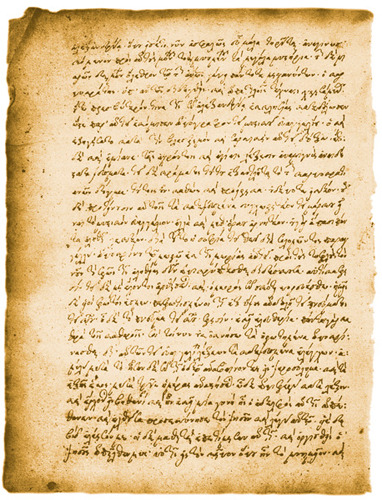
Photograph of page two of "Clement's letter to Theodore". Not only Morton Smith but other scholars also saw this now lost, destroyed or hidden Mar Saba library manuscript. See background information about the Secret Gospel of Mark in the Wikipedia entry linked below.
How to reconcile verses of Secret Mark that seem to fit nicely into the regular Gospel of Mark and are rather intriguing, this despite the fact that the story of the now inaccessible Clement document seems rather suspect (according to most scholars)? I wonder if perhaps there could be some middle ground with Secret Mark. It sounds a bit both-sides-ish (a "Marcion" type position that goes half way, unsatisfying to Gnostics and Orthodox alike!), but perhaps there's some ancient origin of the verses of Secret Mark after all, even though Morton Smith placed (or found) them in a problematic document attributed to Clement of Alexandria. I wonder if Smith discovered the verses somewhere, maybe in a "heretical" book and saw them as legitimate, but for whatever reason decided they would never be taken seriously unless given a better venue, so he created a document attributed to an early church father to serve as a more effective means of sharing the verses?
Another possibility is, and to me this seems far more likely, that Smith was honest in his reporting about the Clement letter, and it was the work of a scribe copying manuscripts long ago that placed these verses of Secret Mark into a forged letter attributed to Clement. Why would some monk who lived many centuries ago do such a thing? The verses might have originated in a gospel deemed by his tradition to be from a heretical source. I will say this. I have seen Orthodox authors in the Philokalia, a collection of mystical writings, quote saints that fell out of favor, were eventually declared to be heretics. Certain Syriac Christian writers have resorted to this maneuver as well. Some mystics valued these kinds of not-so-orthodox passages and wished to quote them anyway, so they gave the sources new names, invented fake names or attributed the quotes to someone more palatable like "Saint Neilos" as a way to get away with quoting material that otherwise would have been off-limits!
For background on Secret Mark, see: https://en.wikipedia.org/wiki/Secret_Gospel_of_Mark
#gospel of mark#secret gospel of mark#morton smith#clement of alexandria#new testament studies#new testament apocrypha#apocrypha#alternative manuscripts of the gospel of mark#early christianity
6 notes
·
View notes
Text
"are you trying to learn ancient greek Menw?"
"...yeah..."
"oh neat! is it to learn some stuff about greek polytheism? maybe to connect with people on the internet?"
"about that..."
"it's to read more early christian writings isn't it?"
*holding bundles of texts by Origen and Clement*
"οὔ"
1 note
·
View note
Text
A very blessed Epiphany to whoever reads this. As this Christmastide draws to a close, may you carry the Divine Light with you throughout the rest of the year.
The priest is in town tomorrow so we get to meet for church. For me it will be the first time receiving the sacrament in four months and I need it more than ever.
I have been so desperately unwell, physically, mentally, and spiritually this last few months. Having the opportunity for Communion is just what I need.
Our priest intends to bring chalk to bless. While he cannot come to each of our houses for a house blessing, the blessed chalk will suffice.
"But the followers of [the early Christian Gnostic religious teacher] Basilides celebrate the day of His Baptism too, spending the previous night in readings. And they say that it was the 15th of the month Tybi of the 15th year of Tiberius Caesar. And some say that it was observed the 11th of the same month."
— Clement of Alexandria (ca 200 CE)
#Epiphany#church#Christianity#gnostic christianity#christian mysticism#Clement of Alexandria#Basilides
0 notes
Text
2023 OCTOBER 01 Sunday
"The doors are open for all who sincerely and wholeheartedly return to God; indeed, the Father is most willing to welcome back a truly repentant son or daughter. The result of true repentance, however, is that you do not fall into the same faults again, but utterly uproot from your souls the sins for which you consider yourself worthy of death. When these have been destroyed God will again dwell within you. By repenting we condemn our past misdeeds and beg forgiveness of the Father, the only one who can in his mercy undo what has been done, and wipe away our past sins with the dew of his Spirit."
~ Saint Clement of Alexandria, Homily “How can the rich be saved?”, 39-40
#bible#gospel#further reading#saint#Clement of Alexandria#homily#doors open for all#sincere#wholehearted#return#God#Father#Lord#Jesus#Christ#repentant#daughter#son#repentance
1 note
·
View note
Text
In discussing the nature and meaning of sleep, Clement urged:
Let us not, then, who are sons of the true light, close the door against the light; but turning in on ourselves, illuminating the eyes of the hidden man, and gazing on the truth itself, and receiving its streams, let us clearly and intelligibly reveal such dreams as are true.
True dreams, Clement believed, come from the depth of the soul, which is always active. He argued that they reveal spiritual reality, the intercourse of the soul with God, and this idea was used by many of the fathers as evidence for the immortality of the soul. As the following words show, he saw sleep as a time of special receptivity to spiritual reality, a time of special clarity in discovering the soul's destiny:
Thus also such dreams as are true, in the view of him who reflects rightly, are the thoughts of a sober soul, undistracted for the time by the affections of the body, and counseling with itself in the best manner...Wherefore always contemplating God, and by perpetual converse with Him inoculating the body with wakefulness, it raises man to equality with angelic grace, and from the practice of wakefulness it grasps the eternity of life.
0 notes
Text
"Faith is the ear of the soul."
- Clement of Alexandria
0 notes
Text
Live Stream Sunday School - May 22, 2022
Live Stream Sunday School – May 22, 2022
https://www.facebook.com/gaines.melvin/videos/576665730548644
Sunday school session for Akron Alliance Fellowship Church, Akron OH.
Biblical Inerrancy – Session 16 – The Church Fathers (Part 3)

View On WordPress
#apologetics#believe#biblical#biblical inerrancy#Clement of Alexandria#defend#faith#Gnostic#Gnosticism#inerrancy#Origen#truth#video
0 notes
Text
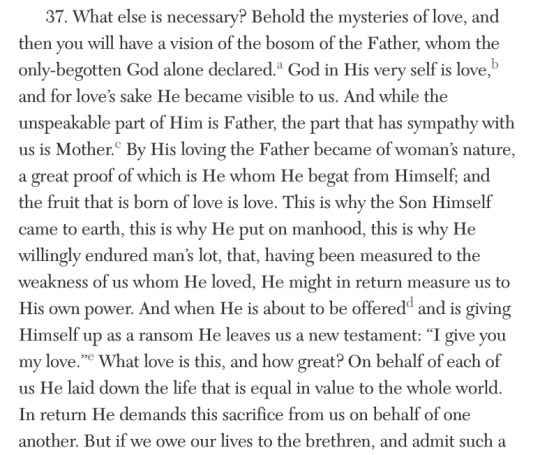
Clement of Alexandria
#clement of alexandria#christianity#divine feminine in christianity#not thrilled with the exclusively male pronouns but this qualifies I guess#love of God#doing christianity#theories of atonement
3 notes
·
View notes
Text

31 notes
·
View notes
Text

Men who offer laudatory speeches to the rich ... are insidious because, although mere abundance is by itself quite enough to puff up the souls of its possessors, and to corrupt them, and to turn them aside from the way by which salvation can be reached, these men bring fresh delusion to the minds of the rich by exciting them with the pleasures that come from their immoderate praises, and by rendering them contemptuous of absolutely everything in the world except the wealth which is the cause of their being admired. In the words of the proverb, they carry fire to fire, when they shower pride upon pride, and heap on wealth, heavy by its own nature, the heavier burden of arrogance.
Οἱ μὲν τοὺς ἐγκωμιαστικοὺς λόγους τοῖς πλουσίοις δωροφοροῦντες ... ἀσεβεῖς μέν, ὅτι παρέντες αἰνεῖν καὶ δοξάζειν τὸν μόνον τέλειον καὶ ἀγαθὸν θεόν, ἐξ οὗ τὰ πάντα καὶ δι᾿ οὗ τὰ πάντα καὶ εἰς ὃν τὰ πάντα, περιάπτουσι τούτου τὸ γέρας ἀνθρώποις ἐν ἀσώτῳ καὶ βορβορώδει βίῳ κυλινδουμένοις καὶ τὸ κεφάλαιον ὑποκειμένοις τῇ κρίσει τοῦ θεοῦ.
—St Clement of Alexandria (Κλήμης ὁ Ἀλεξανδρεύς), The Rich Man's Salvation (c 190 CE)
[Robert Scott Horton]
15 notes
·
View notes